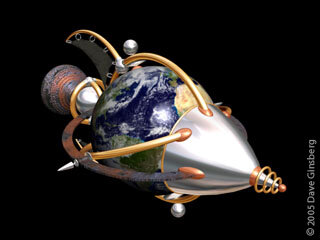I think it is easy to confuse the advancement of social control systems with the idea of "evolutionary advances" exhibited in individual specimens. I would argue that the idea of human evolution and advancement as a "species" has nothing to do with which social control mechanisms or constraints exist at any given time and local. It would only take a couple of generations of ignorance (or a few days without food, water, or rest) to reset those artificial constructs and put us back into more violent modes.
It would only take a couple of generations of ignorance (or a few days without food, water, or rest) to reset those artificial constructs and put us back into more violent modes.
Agreed - but then what would happen? Given the right circumstances would we make the slow climb back "up" to a more civilized mode? Is that also arguably in our nature?
see:
A Canticle for Liebowitz
I would argue that the idea of human evolution and advancement as a "species" has nothing to do with which social control mechanisms or constraints exist at any given time and local.
And I think you could argue it just the other way around . . . I think you could argue that the will to put social control mechanisms in place is as indicative of our species' basic "nature" as the tendency to resort to violence when the controls are off . . . so we're complex - I think Pinker may be saying that it
is the better "angels" of our nature that put those controls in place and that they will re-assert themselves time and again if we do slide "back".
I have a book about rescue stories during the Holocaust - the author examines lots of stories to find out who rescues and why - and comes up with a complex matrix which amounts to:
people generally did what they could - some risked all and their families, some did nothing, but
most did what they could - it might be a loaf of bread, it might be to hide them overnight, it might be simple encouragement, but most people tried to do something.
And the
exact same thing could be said about the German people's participation in the Holocaust -
most did what they could. Some were sadistic prison guards, some refused to help at all and were imprisoned or killed themselves - some gave up their friends, some merely turned their heads but again, most did what they could.
Was their any basic/biological difference in the rescuers and the participants? I don't think so - I'm not even sure cultural differences could account for it . . . they were simply on opposite sides.
I think it is easy to confuse the advancement of social control systems with the idea of "evolutionary advances" exhibited in individual specimens.
We have to tease that out - do "evolutionary advances" come at the individual level? A mutation - but then it has to be passed on and now you have a group and then a population (if it is successful) but if you just have one extraordinary individual, is that an evolutionary advance? Or are just saying that a basic person is potentially no better or worse than they ever were? (I agree with that.)
But it would be hard to imagine a strictly genetic advance that would evolve us toward being "better" people - epigenetics now seems to show that genes actually change the proteins they code for in response to changes in the environment - so what actual genetic change would allow us to become
better people? An increase in mirror/empathy neurons? I would argue more empathy could as easily make a monster as a saint - the best torturer is the one who can imagine just how best to inflict suffering on his victim . . . more intelligence? I don't think there is a correlation between intellect and good behavior.
It could also be argued that individuals don't actually have to become better people for a population to become more civilized. Given the right opportunity, we almost all of us would do nasty, selfish things - but most of us also would participate in rules that restrict our ability to do those things - political constitutions are based on our tendency to do the wrong thing, but the tendency to write and re-write those constitutions is based on our tendency to do the
right thing.
Now - if you are saying each person comes out of the womb with the same basic potential for good and evil as 10,000 years ago I think
yes and I think that is as it should be for the survival of the species and the individual - even the psychopath must play a role - or else that type wouldn't keep turning up generation after generation. But it doesn't negate that given the right opportunity, we tend to civilize ourselves and at least
refine the kinds of harms we do to one another.





